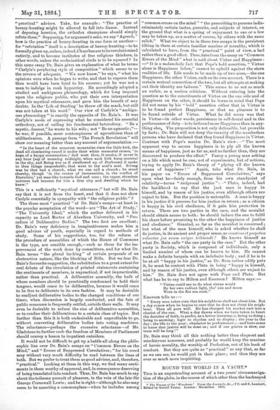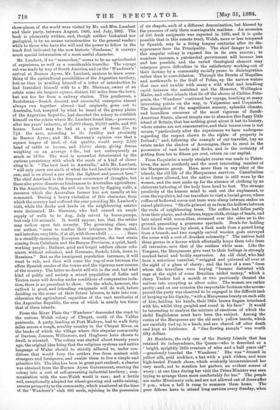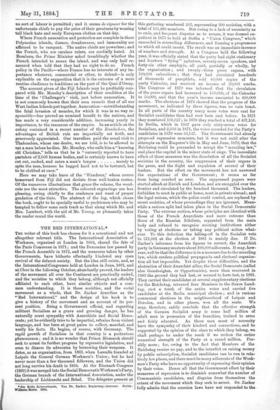ROUND THE WORLD IN A YACHT.*
THIS is an unpretending account of a two years' circumnaviga- tion of the globe, in the course of which other than the hackneyed • The 'Popov of the • Wanderer.' From the Journal., dm., c f O. and 8. Lambert. Edited by Gerald Young. London : Macmillan. 1833.
show-places of the world were visited by Mr. and Mrs. Lambert and their party, between August, 1880, and July, 1882. The book is pleasantly written, and, though neither biological nor geological, is by no means uninstructive to the general reader; while to those who have the will and the power to follow in the track first indicated by the now historic Sunbeam,' it conveys much special information of a most useful character.
Mr. Lambert, if no "researcher," seems to be an agriculturist of experience, as well as a considerable traveller. The voyage out was made by way of South America, and on the Wanderer's arrival at Buenos Ayres, Mr. Lambert, anxious to learn some- thing of the agricultural possibilities of the Argentine territory, lost no time in availing himself of a letter of introduction he had furnished himself with to a Mr. Shennan, owner of an estate some six leagues square, distant 125 miles from the town, but not too far from a railway station. This gentleman, a Scotchman—Scotch descent and successful enterprise almost always run together abroad—had originally gone out to Australia, but, tempted by what he heard of the grassy plains of the Argentine Republic, had deserted the colony to establish himself on the estate where Mr. Lambert found him,—possessor, after ten years' industry, of 35,000 sheep, 10,000 cattle, and 800 horses. Land may be had at a price of from 25s. to 7id. the acre, according to its fertility and- proximity to Buenos Ayres ; and Mr. Shennan's opinion was that a square league of land, of . fair quality, would carry 2,500 head of cattle or horses, and 10,000 sheep, giving fleeces weighing on an average 6 lbs., but not unfrequently as much as 18 lbs. The wool is somewhat deteriorated by the curious persistency with which the seeds of a kind of clover cling to it. "The best land in Australia," adds Mr. Lambert, "will only carry one-sixth of what the best land in this province can, and is on about a par with the lightest and poorest here." The chief drawback is the frequent occurrence of droughts, but these also prove disastrous hindrances to Australian agriculture. In the Argentine State, the evil can be met by digging wells, a resource which the Australian farmer has not usually at his command. During a heavy visitation of this character, from which the country had suffered the year preceding Mr. Lambert's visit, while the flocks and herds on the neighbouring estates were decimated, Mr. Shennan, who had caused an ample supply of wells to be dug, duly served by horse-pumps, lost only 150 animals. It would appear, too, that the settler may reckon upon fair security. The governing class, says our author, "seem to confine their intrigues to the capital, and interfere very little, if at all, with those afield there is a steadily-increasing European immigration, the best strain coming from Catalonia and the Basque Provinces, a quiet, hard- working people ; Italians, good and frugal settlers (those colo- nizers without colonies), and Germans, Scotch, Irish, down to Russians." But as the immigrant population increases, it will want to rule, and then will come the tug-of-war between the effete Spanish creoles of the towns and the vigorous new-comers of the country. The latter no doubt will win in the end, but what kind of polity and society a mixed population of Latin and Teuton races will develop under conditions of comparativeisola- tion, there is no precedent to show. On the whole, however, the outlook is good, and intending emigrants will do well, before deciding on the scene of their future labours, to take into con- sideration the agricultural capacities of the vast territories of the Argentine Republic, the area of which is nearly ten times that of these islands.
From the River Plate the 'Wanderer' descended the coast to the curious Welsh colony of Chupat, south of the Valdez peninsula. A party, landing at Port Madvyn, had to walk forty miles across a rough, scrubby country to the Chnpat River, on the banks of which the village where this singular community of Davises, Joneses, Williamses, and Hugheses have chosen to dwell, is situated. The colony was started about twenty years ago, the original idea being that the religious systems and native language of Wales should be strictly adhered to, under con- ditions that would keep the settlers free from contact with strangers and foreigners, and enable them to live a simple and primitive life. The idea has been in great part realised ; a charter was obtained from the Buenos Ayres Government, erecting the colony into a sort of self-governing industrial territory ; com- munication with the non-Welsh world is rare ; and a fertile soil, exceptionally adapted for wheat-growing and cattle-raising, assures prosperity to the community, which numbered at the time of the 'Wanderer's' visit 800 souls, rejoicing in the possession
of six chapels, each of a different denomination, but blessed by the presence of only three marriageable maidens. An accession of 500 fresh emigrants was expected in 1881, and it is quite possible that in this remote tract, Welsh, more or less tempered by Spanish, may be a living tongue centuries after its dis- appearance from the Principality. The chief danger to which this singular colony is exposed lies in its own success ; as numbers increase, a patriarchal government will become less and less possible, and the varied theological element may interpose grave difficulties in the satisfactory working-out of their destiny by a community racially prone to disintegration rather than to consolidation. Through the Straits of Magellan and northwards to the Gulf of Peiias, up the narrow waters that race and tumble with many a wild whirl and headlong rapid between the mainland and the Hanover, Wellington Madre, and other islands that lie off the shores of Chilian Pata- gonia, the 'Wanderer' continued her voyage, touching at many interesting points on the way, to Valparaiso and Coquimbo. The description of the magnificent scenery, splendid climate, and boundless resources of the most vigorous of South- American States, almost tempts one to abandon this foggy little island of Britain, that has nothing great about it but its history, where estates are not remunerative, and their tenure even is not secure, "particularly after the experiences we have undergone regarding the respect shown to the rights of property in Ireland ;" and, following the example of our traveller, buy an estate under the shadow of Aconcagua, there to revel in the possession of vast herds and flocks, and in the certainty of getting from ten to fifteen per cent, return on cur capital.
From Coquimbo a nearly straight course was made to Eaton- hiwa, the most southerly and the most interesting member of the Marquesas group. Here, more than in any other of the islands, the old life of the Marquesaus survives. Cannibalism is no longer allowed, but the native dress is still worn by the women, and the men make up for the absence of clothing by an elaborate tattooing of the body from head to foot. The strange proclivity of the human mind to seek out the unpleasant, or even the repulsive, led our travellers to visit a burial-grove, where coffins of hollowed cocoa-nut trees were slang between stakes on raised platforms. "Skulls grinned at us from the hollows between the roots of neighbouring trees. The coffins had fallen partly from their places, and skeletons, tappa-cloth, strings of beads, and hair mixed with cocoa-fibre, streamed over the sides on to the ground, presenting a gruesome spectacle. Bowls for holding food for the corpses lay about, a flask made from a gourd hung from a branch, and two roughly carved wooden gods surveyed the scene with a sort of drunken solemnity." The natives hold these groves in a horror which effectually keeps them tabu from all intrusion, save that of the restless white man. Like the Tongans, the Marquesans give vent to their feelings in strongly marked facial and bodily expression. An old chief, who had been a notorious cannibal, "wriggled and quivered all over at the sight of a glass of sherry; and the face of a man" from whom the travellers were buying "became distorted with rage at the sight of some Brazilian nickel money," which a sharp Yankee had a month or two previously cheated the natives into accepting as silver coins. The women are rather pretty; and on one occasion the respectable footman who accom- panied the party was observed to be engaged in the difficult task of keeping up his dignity," with a Marquesan beauty on each side of him, holding his hands, their little brown fingers interlaced with his, whilst they gurgled and cooed in his face." It would be interesting to analyse the mixture of emotions of which the stolid Englishman must have been the subject. Among the curios of the Marquesas are the old men's yellow beards, which are carefully tied up in a knob, and are shaved off after death and kept as heirlooms. A "fine flowing sample" was worth fifty dollars.
At Borabora, the only one of the Society Islands that has retained its independence, the Queen—who is described as a
bright, sprightly little creature of nine and a half years old" —graciously boarded the Wanderer.' She was "dressed in yellow silk, gold necklace, a hat with a pink ribbon, and wore high-heeled French shoes, which evidently inconvenienced her very much, not to mention her garters, an evident source of worry ; at one time during her visit the Prime Minister was seen trying to arrange these more comfortably for her." The people are under Missionary rule, and are not allowed out of doors after 9 p.m., when a bell is rung to summon them home. The poor fellows have to attend long services every Sunday, when
no sort of labour is permitted ; and it seems de rigueur for the unfortunate chiefs to pay the price of their greatness by wearing tall black hats and seedy European clothes on that day.
Where French annexation and protection are complete in these Polynesian islands, disease, drunkenness, and immorality are affirmed to be rampant. The native chiefs are powerless ; and the French, who are careless rulers, are cordially hated. At Borabora, the Prime Minister asked tremblingly whether the French intended to annex the island, and was only half re- assured when told that they had no right to do so. French policy in the Pacific—where France has no interests of any im- portance whatever, commercial or other, to defend—is only explicable on the supposition that it is the outcome of a. mere routine obedience to traditions on the part of the Quai d'Orsay.
The account given of the Fiji Islands may be profitably com- pared with Mr. Moseley's description of their condition at the time of the 'Challenger's' visit, just before annexation. It is not commonly known that their area exceeds that of all our West Indian Islands put together. Annexation—notwithstanding the fatal invasion of measles, for which it was in no way re- sponsible—has -proved an unmixed benefit to the natives, and Me made a very considerable addition, increasing yearly in importance, to the resources of the empire. In an article on the colony contained in a recent number of the Bundechau, the advantages of British rule are impartially set forth, and generously appreciated. Our travellers paid the usual visit to Thakombau, whose one desire, we are told, is to be allowed to eat a man before he dies. Mr. Moseley, who calls him a" knowing old Christian," tells us that he is currently reported to have partaken of 2,000 human bodies, and is certainly known to have -cut out, cooked, and eaten a man's tongue merely to spite the man, because he begged hard not to be tortured, but to be clubbed at once."
Here we may take leave of the Wanderer,' whose course homeward from Fiji did not deviate from well-beaten routes. Of the numerous illustrations that grace the volume, the wood- cuts are the most attractive. The coloured engravings are less pleasing, owing chiefly to the crudeness and want of proper gradation of the tints. The abstract of the log, which closes the book, ought to be specially useful to yachtsmen who may be tempted to follow some such track as that along which Mr. and Mrs. Lambert, with the aid of Mr. Young, so pleasantly takes the reader round the world.




































 Previous page
Previous page